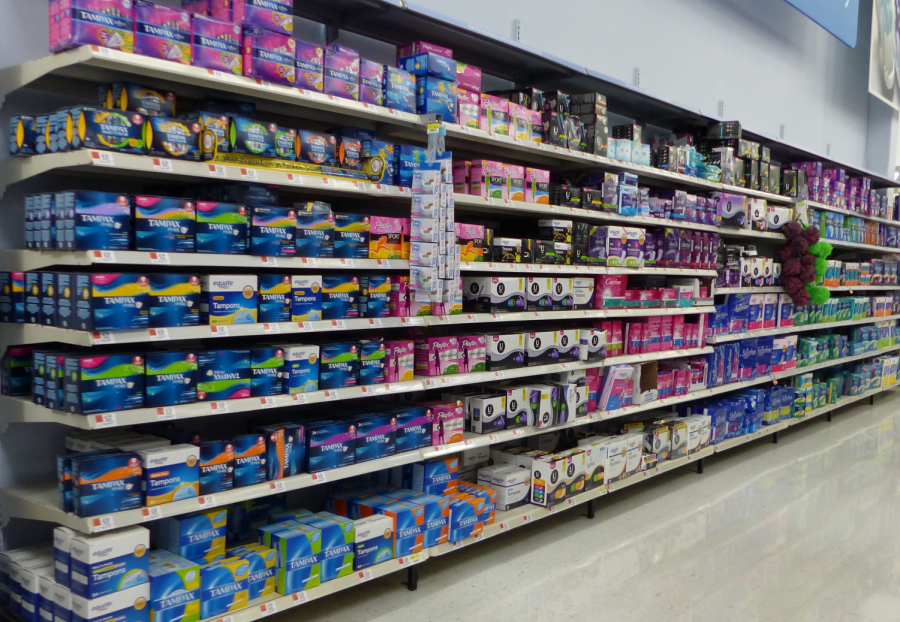Christopherson: Utah Women Need Tax-Free Feminine Hygiene Products and a Feminist Legislature
This bill’s “fate — to be ignored, like so many sexist inequities and so many women — is sadly predictable.” (Courtesy WikiMedia Commons)
March 11, 2020
This year’s legislative session, like any other, has been a mixed bag.
Elected officials passed bills to encourage schools to delay start times for students’ health, form a task force to protect indigenous women and expand mental health services, among other important measures.
Some negatives have been even more extreme, though. A bill requiring all women to get an ultrasound before receiving an abortion is also likely to be signed into law, for example. Legislators tried to squash bills that would change many Utahns’ lives for the better, though at least HB 222, which would expand school breakfast for K-12 students, came back from the dead. Given all this, it shouldn’t be surprising that our Republican-controlled legislature has kept HB 193 — a bill that would have helped women and families by eliminating taxes on diapers and feminine hygiene products — stuck in committee since the session’s third day, but it’s disappointing all the same.
HB 193, sponsored by Rep. Susan Duckworth, would have created a sales and use tax exemption for diapers and feminine hygiene products like tampons, pads and menstrual cups. The idea is not original to Rep. Duckworth — many states have attempted to eliminate or reduce taxes on these products in recent years, though few have met with success.
Opponents of these efforts have resisted on financial grounds, insisting that their states couldn’t afford the loss of revenue that comes from the “tampon tax.” But that argument is evidence in and of itself that states — not to mention companies who charge more for feminized versions of products every adult needs, like razors — are knowingly exploiting women for money. This kind of gender-specific pricing is known as the “pink tax.”
The pink tax is not simply a minor inconvenience — it costs the average U.S. woman roughly $1,300 each year, exacerbating the economic hardship many women already face because of the gender pay gap, which is particularly extreme in Utah. As of 2019, the average woman in our state earns almost $15,000 less than the average man, with even larger disparities for women of color.
It may have been small, but Rep. Duckworth’s bill would have put a dent in that additional $1,300 annual expense for Utah’s women and girls. It seems like the kind of bill that should have been pushed through the legislature and passed in a few days — but somehow it never made it past the House Rules Committee. That comes as a minor shock in a state where legislative leaders are champing at the bit to cut taxes even amid constituent resistance. In fact, they included a tampon tax cut in their 2019 tax reform bill, which (if it had not been repealed) would have hurt women and families overall. Now, when they have an opportunity to directly benefit these groups with no undesirable strings attached, they’re totally uninterested.
On the other hand, HB 193’s fate — to be ignored, like so many sexist inequities and so many women — is sadly predictable, serving as a grim reminder that we live in the second most sexist state in America. Of course, it comes alongside several other discouraging choices by our government this session. Rep. Karen Kwan’s resolution to ratify the federal Equal Rights Amendment was also trapped in committee early on, and Sen. Curtis Bramble successfully sponsored a bill requiring burial or cremation of fetal remains from abortions as well as miscarriages. The Salt Lake Tribune’s Editorial Board put it nicely in 2018: “Utah does poorly by its women.” With deeply internalized misogyny as the one truly representative feature of our legislative body, it’s difficult to imagine things changing for Utah women soon.
At this point, with the 2020 legislative session coming to a close, my only hope is that Rep. Duckworth and Utah’s other Democratic lawmakers will continue pushing for a tampon tax cut and other feminist changes each year until they happen. In the meantime, I’ll keep voting and calling my representatives to let them know what I expect from them — and so should you.













Michael Turner • Mar 17, 2020 at 9:17 pm
Dear Miss Christopherson (and I extend this answer to feminists in general), here’s how I see it; and no, I’m not disqualified because I’m a male, and worse, a white one at that:
May I remind you folks here that a sizable portion of women in this state happily subscribe to the dominant religion here, which you regard as brutally misogynistic. Regardless of what you think, they happily embrace their gender role within that culture: being a mother. They’re just as educated as any of you—often more. But they see their children as more important than the almighty dollar. That, in turn, skews your statistics about gender pay gaps tremendously. Furthermore, women are starting to dominate the corporate hierarchy and the college campuses. We’ve heard you; you’ll be in charge soon enough. Just leave us men to our PS4s, then you can legitimately complain about us not doing anything.
To the article: based on your figure of $1300 annually, your “pink tax” oppression amounts to an onerous ~$104 annually per woman affected. That works out to less than $9 per month. The average woman spends more on coffee in a 2-day period and thinks nothing of it. Furthermore, the cheapest form of birth control—condoms—would eliminate half that financial burden even if you were sexually active every day. (No babies, no diapers.)
In your article, you complain about overpriced feminized products, like razors. Got news for you: the male versions work just as well on your legs and unmentionables as the women’s versions. The same goes for all the overpriced hair care products, body lotions, fragrant soaps, perfumes, clothes, etc. Why are you paying more for these things—because they’re adorably pink? This isn’t misogyny; it’s Economics 1010. Stop choosing style over substance!
While we’re on the subject, why are you ladies still shaving at all? That’s a fantasy body image that is now a century old. Why are you ceding your power to a male-contrived idea of beauty—the male gaze that you find so oppressive? Are you feminists or aren’t you?
As for feminism in general, I hear precious little about the oppression of women throughout the world: whether that’s ten-year-old girls in Central America, South America, and India, who are child brides and end up having a dozen children by the time they’re thirty, or girls who are threatened with burning at the stake, attacked with acid or gang-raped by Islamic zealots; just for trying to educate themselves and make a future that doesn’t involve a burqa. There’s misogyny to be condemned and stopped! Instead, I hear first world women in America whingeing how oppressed they are about getting taxed on tampons! You sound like Veruca Salt.
Why don’t you journalists try something different? Find people who’ve made it work and hold them up as examples to follow. In the time of the Corona Virus pandemic, particularly, I’m witnessing neighborhoods coming together in concern and kindness for each other’s well-being. But not a peep about that from you folks: it’s not sensational; it’s not a story about power or oppression; consequently, it will be ignored.
In conclusion, I grow weary of the continual victimhood that is expressed in so many articles by the U’s journalism department. The answer is always the same: why doesn’t the government do it our way, when it’s clearly the way to go?
Says you.